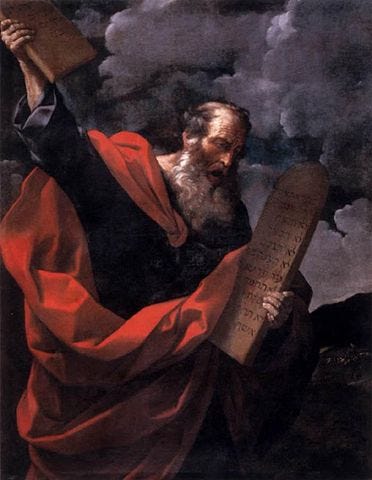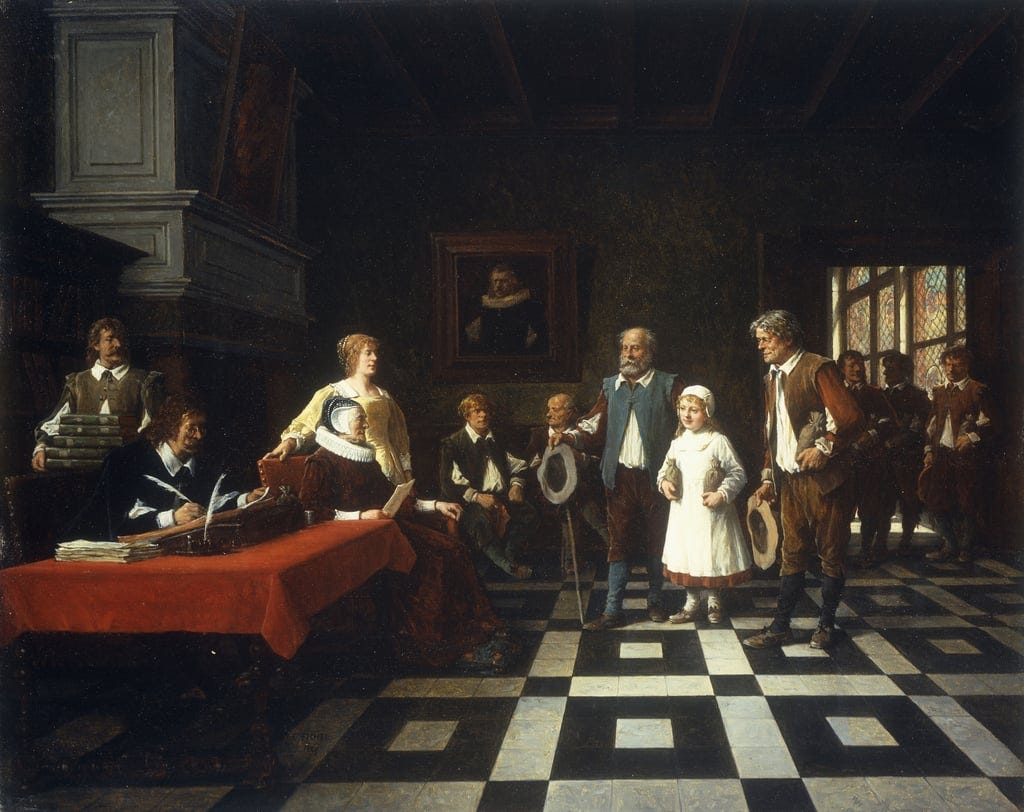Of Gods and Steam Engines: A (Brief) Genealogy of Power, Part One
Quid ex Machina, Section 2 of Act II Scene 3. Theme song from Stranger than Fiction
Welcome! 😄I’m Helen and here I write about the fortunes that come from the Earth: geography, medieval farming, music, time, and the Unseen.
This is a new essay of the series Quid ex Machina, about the Unseen impact of AI (and more broadly, technology) on our societies. Here’s the rest of the series .
Today’s theme song is the soundtrack from the 2006 movie Stranger than Fiction.
The King rules, but does not govern.
(Adolphe Thiers, during the July Revolution of 1830)
In the last essay, I spoke about how software makers are the invisible law-givers of our age. As promised, this is the first of two essays where I chart a brief history on the source of power in law-making. How did we come to this place, where software makes laws that govern our lives?
Software Governs
If you live in Canada, you may have noticed: more Nickelback videos and Justin Bieber vocals are popping up on your Youtube and Spotify mix.
Well, congratulations: you just met the latest example of software governing our lives. A new Canadian law requires that streaming media companies (Youtube, Spotify, Netflix, etc.) promote “Canadian content” within Canada. But instead of boosting Glenn Gould and Oscar Peterson as Canadian excellence in music, the software at Youtube and Spotify floats Nickelback and Bieber – to the ears of 37 million people.
By “software,” I mean a lot more than social media or content algorithms. Think about it:
The digital thermometer. It tells the nurse that your body temperature is normal at 98.6 F / 37 C, when your forehead is burning with fever.
The DMV records system. It doesn’t allow a hyphen or a umlaut letter in your name.
The CAPTCHA pop-ups. They judge if you are human. If you didn’t click on all the squares with a lemon, you are just not human anymore.
The Windows update banners. They force system updates on you. Doesn’t matter you don’t want it, the software deems it right and proper to do so.
The list goes on. My point is: the vast majority of software is petty and unsexy, but they entrench our lives — they set rules for our conduct, judge our actions, and control our behaviors. Unlike dramatic floor fights in senate chambers that make national news, these software run silently in the background. This is the difference between “ruling” and “governing”. In the spotlight, the Canadian parliament rules: it declares principles, and makes laws to promote Canadian content. In everyday life, software at Youtube and Spotify govern: it controls exactly what to promote, at what times, and how to do it — then got us Nickelback and Bieber.
Of course, to govern is the life goal of any law-giver. And software doing the governing is only the latest trend in a millennia-long arch of history. The power to give laws, to rule and govern, has passed on from the gods and their favorite heroes, to kings and their ministers, and now to software and their makers.
What follows in this essay, is part one of my attempt at compressing this long history into a very brief genealogy of power.
The Gods of Law
In the old days, kings and prophets from around the world all got their playbooks from some supernatural source:
Moses received his laws from Yahweh.
Hammurabi got his Code from Utu the sun god.
Goddess Athena set court precedents for the mortal Greeks.
Roman laws started out as an off-shoot of Roman religion.
“Mandate of Heaven” was bestowed on the rightful emperors of China.
Japanese tennos claimed ancestry from the sun goddess Amaterasu.
These stories all point to a common thread running through the pre-18th century world: only the divine can give power to Men. Divine approval was the source of legitimacy and authority of human rulers. In those bygone times, laws came from the supernatural and the mythical.
But receiving divine blessing was only the first, tiny step for all kings. Their names would now be heard in the realm, saluted by their ministers, and revered by the commoners. They could now rule. But to actually run their vast realms, they needed to govern – and do a lot of it.
The divine intervened again on the kings’ behalf. Or, we should say that ancient kings pioneered the business model of outsourcing: they outsourced the governance of their kingdoms to local communities — particularly, the local priests. From pagan shrines to Christian churches, the places that worship the supernatural also ran the mundane business of governing villages or city quarters. Records of birth, death, and marriages were created and managed by priests; civil disputes were settled in parish quarters — or if they escalated so badly, the priests would record them in parish annals. That’s why historians love archives of local churches, because that’s where you find out everything about everyone in town.
The kings even outsourced the other inevitable part of life: taxes. There was no IRS, CRA, or HMRC that answered directly to the kings, so this enviable task fell on the local land owners of each town and village.
Imagine this: come every April 15th, your landlord personally collects taxes from you, and turns it in to the IRS – because he is also an IRS tax agent. In our 21st century minds, we’d think the landlord was scamming or pranking us. But to pre-18th century farmers, townfolks, and crafts people, this was the right and proper way to pay their taxes. This was how things have always been done for their parents, grandparents, many generations and hundreds of years before them.

There was only one problem: every town and village is different from the next. There’s no comparison between a mountain-top village to a seaside trading port. The local priests and land owners knew this, so they adapted their approaches to governing. By “adapt,” I mean they bent the kings’ laws, and made up their own rules for local communities. The kings may be honored in their names — they ruled — but they did not govern, because their laws were not the laws of peasants in a village where 90% of the people was illiterate, and it took 3 months of donkey-ride to the capital. The peasants’ lives were controlled to the last detail by the local elites, who actually did the governing.
Of course, the kings knew their laws were bent and disregarded, despite the divine favor they got. So for millennia, they wrestled with local powers, but almost always lost.
Then time rolled forward to the 18th century. The Industrial Revolution came to the aid of ambitious kings, who wanted to take the governing power for themselves.
Engines of Governance
Let’s make the landlord-as-tax-collector example more ridiculous.
Your landlord says, “The tax rate set by the IRS is 25% of your total income, no matter how much you make.” So you pay him that amount. The next day, your twin comes to visit from another apartment building. She tells you that according to her landlord, the tax rate set by the IRS is a flat 20% on total income.
You are confused and want to know what the real rate is. Months later, you finally get your hands on an official document: the flat rate is 15%. Both you and your twin were fleeced.

However implausible it sounds, this is typical before the Industrial Revolution. Outsourced governance had many problems, and tax collection was a major one. For one, tax rates varied widely from one region to another, and they often bear no relation to rates set out in official decrees. Beyond the opaqueness, for much of the population, taxes were never collected consistently. The kings knew and hated this problem, but they could do nothing about it. They outsourced the governing, because they had to: the local elites knew everything about the town, the kings knew nothing to make governing decisions, and never fast enough.
Until the Industrial Revolution changed the game. Steam mills and reaping machines outworked any manual labor, and produced food more than enough for a farming family. Spinning Jenny spun more textiles than any human weaver. To move these excess goods around, coal and iron powered up steam engines and ships at speeds faster than any racing horse.
This great jump in production power and output demanded more and better roads to move goods, faster ways to pass on information, and more accurate accounts of who’s where at what times, so massive labor demands can find sufficient supply.
And for a king who wanted to govern, these changes were music to his ears. For the first time in history, instead of knowing nothing about a town, the king knew as much – land, population, production, transportation options, and revenue streams — as the local priest and land owners. Thanks to steam motors and ships, all this knowledge could reach him much faster, and his laws could reach these towns faster, too.
This is the Industrial Revolution’s answer to the problem of tax collection. No need to hear from your landlord anymore, because the king’s decree on tax rates will reach you in the matter of days, not months. And without the middleman landlord, you only need to deal with professional tax collectors answering directly to the king.
The Industrial Revolution made it possible for the king to govern, but it didn’t endow more legitimacy in him. No royal edict ever began with “in the name of steam motors, iron ores, and reaping engines.” The king still called on the divine as the source of his legitimacy and authority to make laws, to rule and govern.
For the power of law-making to pass from the gods to the kings, it took another capital-R Revolution. In the next essay, we’ll trace this genealogy of power from the Industrial Revolution all the way into the 20th and 21st century.
Thank you for reading Earthly Fortunes! Like it? Please share it! 😄 Subscribe for more earthly fortunes: geography, music, time, medieval farming, and the Unseen.
I’d love to hear your thoughts! Comment below, DM me on Twitter or Instagram, or reply to the email! Anything you send me, I’ll read it 😄







Great essay, Helen. I was hooked on every word. I loved how you dove back into the history of law-making. I was not expecting to learn about kings and divinity based on the title.
Awesome work :)
Damn, Helen. This is like one of those tv series that you look forward to returning to and watch the next episode. And then wait impatiently for the next season. One day, I'll collect all of your pieces into a book. Just for myself. Thank you for taking me on such a captivating educational journey. :)